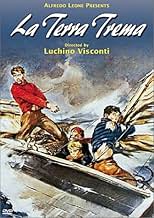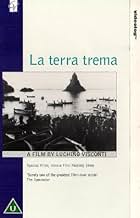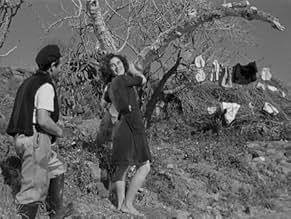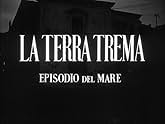In rural Sicily, the fishermen live at the mercy of the greedy wholesalers. One family risks everything to buy their own boat and operate independently.In rural Sicily, the fishermen live at the mercy of the greedy wholesalers. One family risks everything to buy their own boat and operate independently.In rural Sicily, the fishermen live at the mercy of the greedy wholesalers. One family risks everything to buy their own boat and operate independently.
- Director
- Writers
- Stars
- Awards
- 1 win & 1 nomination total
Luchino Visconti
- Narrator
- (voice)
- (uncredited)
Antonio Pietrangeli
- Narrator
- (voice)
- (uncredited)
Antonio Arcidiacono
- Ntoni
- (uncredited)
Giuseppe Arcidiacono
- Cola
- (uncredited)
Venera Bonaccorso
- La vecchia che ride
- (uncredited)
Nicola Castorino
- Nicola
- (uncredited)
Rosa Catalano
- Rosa
- (uncredited)
Rosa Costanzo
- Nedda
- (uncredited)
Alfio Fichera
- Michele
- (uncredited)
Carmela Fichera
- La baronessa
- (uncredited)
Agnese Giammona
- Lucia
- (uncredited)
Nelluccia Giammona
- Mara
- (uncredited)
Ignazio Maccarone
- Maccarone
- (uncredited)
Giovanni Maiorana
- Un bambino
- (uncredited)
Antonino Micale
- Vanni
- (uncredited)
Maria Micale
- La madre
- (uncredited)
- Director
- Writers
- All cast & crew
- Production, box office & more at IMDbPro
Featured reviews
The first time I had encountered the director Luchino Visconti was when I was more and more into the Italian Neorealism, the movement that can probably be considered one of the most genuine waves in European cinema. Having seen Visconti's most popular movies, including IL GATTOPARDO, L'OSSESSIONE, LA CADUTA DEGLI DEI or MORTE A VENEZIA as well as his earlier productions, I started to understand his conception of art in movie and it gradually appealed to me more. However, I realized that Visconti was the aristocrat who became a member of the Communist party representing the left wing of Italian artists. Even this film made way for the Italian socialists, which, for me, is not a very privileged information. But that is not the gist of my analysis. The most important aspect for me is the artistic side of the whole work, something in terms of which we evaluate LA TERRA TREMA nowadays.
LA TERRA TREMA, though not a top notch Neorealist work, is a film that resembles almost all the principles of Neorealism retained by the great directors: Rossellini, DeSica, Pasolini. At the same time, all of these aspects are still much appreciated and searched by many today's authors.
First, the cast consist of all non-professionals: simple fishermen of Sicily where, naturally, everyone has the role he/she knows how to perform in real life. And how they do in the movie: perfectly, the whole story is very authentic thanks to them. Sometimes, the performances are so well managed that you, as an experienced 21st century viewer, do not feel it's all acting. Moreover, they feel comfortable in the locations they know: so magical places of the Sicilian coast.
Second, the movie refers to the very realistic situations that were obvious in the Italy of that time. It was 1948 and the country was suffering the horrific consequences of WWII and the regime of "Il Duce" Mussolini. The tragic story of the Valastro family is something many people could empathize with at the time and, moreover, can still empathize nowadays. Ntonio, though formerly respected member of the community (Sicilian village of Acci Trezza) starts to lose everything. There comes a day when he has no job, is taken advantage of any time being no more respected. His brother Cola is on the verge of despair leaving the family to find a better future. Two sisters experience hardship as young women. The grandpa gets ill. The whole family is on the verge of total tragedy when they are forced to leave the house, their only property. The monotonous life gets even worse, turns into the life of poverty, helplessness and suffering. Is there a way to live a normal life in such circumstances?
Third, the whole movie is a profound development of characters within these very personal stories. Ntonio is an idealist who tells his brother that his love to his hometown has kept him there and will keep him till his death ("We were born here and we will die here"). At the same time, he is easily brought to despair (starts to spend the nights drinking in taverns). Cola is a youngster who respects his family but desires a better life. I'll never forget the scene he says "Farewell" to the picture of his family when sorrow is combined with fear and helplessness with desire. Mara is a very religious young woman who accepts sorrows and hardship claiming this all is the Will of God. The other sister, Lucia, is a normal girl, like every other; yet the tragic situation leads her to the cold acceptance of "male use." The little shining necklace seems to steal her heart.
Similarly to the top Neorealist movies, like GERMANIA ANNO ZERO or ROMA CITTA APERTA, LA TERRA TREMA focuses on individuals in the society, in the community at hard times. On the one hand, there are so many praying women at Valastro's house when the grandfather is being taken to Catania, to hospital; on the other hand, the Valastro family hear very bitter words "God has punished you for your pride!" from the same people. It is not the ostentation but solidarity of people that leads to better future, better life; it is the lack of solidarity that leads to hell on earth. That is beautifully executed in Ntonio's conversation with a simple girl on the shore at his past boat: "I'd gladly help you"... Politically and historically speaking, that was the point which gave way to socialist ideas.
But so far, I have not touched the most significant aspect why the film is so much worth seeing. Although it is pretty long, it is black and white, it has the narrator that may distract some of the modern viewers, LA TERRA TREMA is "like a loaf of bread to the poor", a wonderful gift for today's viewers who may see what a film may be like, how many messages it can convey, not from the political perspective only but from a simple empathy with humanity, which was most precious thing about Neorealism calling for change. Although these times are gone forever and some islands of poverty turned into isles of prosperity, this change is still so desirable...
See this! You'll not regret and don't be discouraged by its length and documentary like style. It's worth your search! By the way, one of the assistant directors of the movie was Maestro Franco Zeffirelli
LA TERRA TREMA, though not a top notch Neorealist work, is a film that resembles almost all the principles of Neorealism retained by the great directors: Rossellini, DeSica, Pasolini. At the same time, all of these aspects are still much appreciated and searched by many today's authors.
First, the cast consist of all non-professionals: simple fishermen of Sicily where, naturally, everyone has the role he/she knows how to perform in real life. And how they do in the movie: perfectly, the whole story is very authentic thanks to them. Sometimes, the performances are so well managed that you, as an experienced 21st century viewer, do not feel it's all acting. Moreover, they feel comfortable in the locations they know: so magical places of the Sicilian coast.
Second, the movie refers to the very realistic situations that were obvious in the Italy of that time. It was 1948 and the country was suffering the horrific consequences of WWII and the regime of "Il Duce" Mussolini. The tragic story of the Valastro family is something many people could empathize with at the time and, moreover, can still empathize nowadays. Ntonio, though formerly respected member of the community (Sicilian village of Acci Trezza) starts to lose everything. There comes a day when he has no job, is taken advantage of any time being no more respected. His brother Cola is on the verge of despair leaving the family to find a better future. Two sisters experience hardship as young women. The grandpa gets ill. The whole family is on the verge of total tragedy when they are forced to leave the house, their only property. The monotonous life gets even worse, turns into the life of poverty, helplessness and suffering. Is there a way to live a normal life in such circumstances?
Third, the whole movie is a profound development of characters within these very personal stories. Ntonio is an idealist who tells his brother that his love to his hometown has kept him there and will keep him till his death ("We were born here and we will die here"). At the same time, he is easily brought to despair (starts to spend the nights drinking in taverns). Cola is a youngster who respects his family but desires a better life. I'll never forget the scene he says "Farewell" to the picture of his family when sorrow is combined with fear and helplessness with desire. Mara is a very religious young woman who accepts sorrows and hardship claiming this all is the Will of God. The other sister, Lucia, is a normal girl, like every other; yet the tragic situation leads her to the cold acceptance of "male use." The little shining necklace seems to steal her heart.
Similarly to the top Neorealist movies, like GERMANIA ANNO ZERO or ROMA CITTA APERTA, LA TERRA TREMA focuses on individuals in the society, in the community at hard times. On the one hand, there are so many praying women at Valastro's house when the grandfather is being taken to Catania, to hospital; on the other hand, the Valastro family hear very bitter words "God has punished you for your pride!" from the same people. It is not the ostentation but solidarity of people that leads to better future, better life; it is the lack of solidarity that leads to hell on earth. That is beautifully executed in Ntonio's conversation with a simple girl on the shore at his past boat: "I'd gladly help you"... Politically and historically speaking, that was the point which gave way to socialist ideas.
But so far, I have not touched the most significant aspect why the film is so much worth seeing. Although it is pretty long, it is black and white, it has the narrator that may distract some of the modern viewers, LA TERRA TREMA is "like a loaf of bread to the poor", a wonderful gift for today's viewers who may see what a film may be like, how many messages it can convey, not from the political perspective only but from a simple empathy with humanity, which was most precious thing about Neorealism calling for change. Although these times are gone forever and some islands of poverty turned into isles of prosperity, this change is still so desirable...
See this! You'll not regret and don't be discouraged by its length and documentary like style. It's worth your search! By the way, one of the assistant directors of the movie was Maestro Franco Zeffirelli
In 1947, in Sicily near Catania, the fishermen in Aci Trezza have been exploited by generations by the local middlemen. The young 'Ntoni Valastro rebels against the economical situation of his poor family and convinces the Valastro to mortgage their simple house in the Fidania Bank in Catania to buy a fish boat of their own and never work again for the wholesalers. In a stormy day, he decides to fish due to the necessity of repaying the debt to the bank; however, the storm destroys his boat and the dream of his family. Without any support and job, 'Ntoni sees the disintegration of his outcast family.
"La Terra Trema: Episodio del Mare" is a heartbreaking, bitter and cruel story of a family of fishermen that decides to change their poor economical situation facing the powerful exploiters. The Marxist "Red Count" Luchino Visconti directs and narrates this little masterpiece of the Italian Neo-Realism casting non-professional actors and actresses, actually fishermen and inhabitants of Aci Trezza. The abusive treatment of the greedy and idle wholesalers gives an idea of how workers were exploited in this period of history and the reason for the ideological fight of classes between Communism and Capitalism. In Brazil, this film was released on DVD by Versátil Distributor. My vote is nine.
Title (Brazil): "A Terra Treme" ("The Earth Shakes")
"La Terra Trema: Episodio del Mare" is a heartbreaking, bitter and cruel story of a family of fishermen that decides to change their poor economical situation facing the powerful exploiters. The Marxist "Red Count" Luchino Visconti directs and narrates this little masterpiece of the Italian Neo-Realism casting non-professional actors and actresses, actually fishermen and inhabitants of Aci Trezza. The abusive treatment of the greedy and idle wholesalers gives an idea of how workers were exploited in this period of history and the reason for the ideological fight of classes between Communism and Capitalism. In Brazil, this film was released on DVD by Versátil Distributor. My vote is nine.
Title (Brazil): "A Terra Treme" ("The Earth Shakes")
A Marxist aristocrat, Count Don Luchino Visconti Di Morone was widely praised for both the realism and vaguely politicized tone of his early films, and the operatic sumptuousness of his later historical costume dramas... Throughout his career, however, style dominated content; all too often, the result was camp, decorative melodrama disguised as solemn, socially significant art...
"La Terra Trema," an epic account of the hardship suffered by Sicilian fishermen, was even closer to Neo-realism, shot on location with a cast of nonprofessional actors living their lives on screen... Its somewhat simplistic Marxist message, that the peasants' real enemy was not Nature but exploitive businessmen, was in fact less indicative of Visconti's future and its use of a disintegrating family to mirror the social climate of Italy as a whole...
The conflicts, misery, poverty, joy, and anger in a fishing village are shown in a panoramic study of man and earth...
'The Earth will Tremble' is not political nor intends to teach... The film reveals... it doesn't judge...
The cinematography is outstanding, particularly the scenes with the fishermen at sea...
"La Terra Trema," an epic account of the hardship suffered by Sicilian fishermen, was even closer to Neo-realism, shot on location with a cast of nonprofessional actors living their lives on screen... Its somewhat simplistic Marxist message, that the peasants' real enemy was not Nature but exploitive businessmen, was in fact less indicative of Visconti's future and its use of a disintegrating family to mirror the social climate of Italy as a whole...
The conflicts, misery, poverty, joy, and anger in a fishing village are shown in a panoramic study of man and earth...
'The Earth will Tremble' is not political nor intends to teach... The film reveals... it doesn't judge...
The cinematography is outstanding, particularly the scenes with the fishermen at sea...
Luchino Visconti's vivid portrayal of the grinding poverty endured by Sicilian fishermen under the oppressive rule of grasping wholesalers is a relentlessly grim saga that casts an unflattering light on the crowd's blind propensity to condemn those who strive to rise above their lot in life. Depressing stuff, but hugely compelling in spite of its lengthy running time.
I saw this movie Friday night on TCM. I'd never heard of it, but I'm a neorealismo fan, so I watched. I'm sorry I didn't tape it, what an epic! Like "The bicycle thief," this movie uses real people, and almost feels like a documentary at times. I agree that the sentiments are rather marxist, but I have to admit that if I lived as these people do, I might be drawn to communism, too. There are some subtle (or maybe not so subtle) references to the politics of the times, wall posters about Mussolini and the hammer and sickle images painted on the walls. Oddly, this movie reminded me somewhat of "Man of Aran," the images are that stark, life is that bleak. The film is beautifully shot, and the story is wrenching. Watch it if you get the opportunity. It memorializes a way of life that is gone, and I'll bet there's not a single person who misses it.
Did you know
- TriviaThe cast was exclusively composed of non-professional actors. They were genuine fishermen and inhabitants of Aci Trezza (Sicily). The credits do not name any of the actors, who are collectively listed as "Pescatori Siciliani" (Sicilian Fishermen).
- Quotes
Title Card: [in Italian] In Sicily, Italian is not the language of the poor.
- Alternate versionsWas originally released without Italian narration, but it flopped because the Italian audience could not understand the Sicilian dialect. Visconti re-released it with his own narration, which many find detracts from the film.
- ConnectionsEdited into Bellissimo: Immagini del cinema italiano (1985)
- How long is La Terra Trema?Powered by Alexa
Details
- Runtime2 hours 40 minutes
- Color
- Aspect ratio
- 1.37 : 1
Contribute to this page
Suggest an edit or add missing content






















